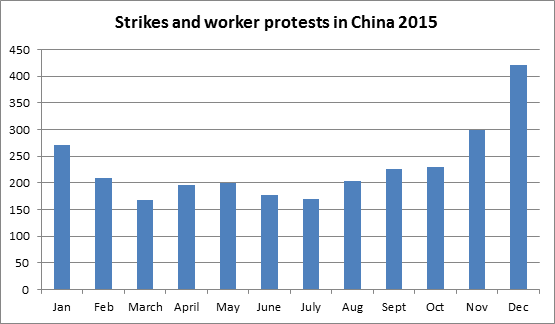Chinese Government Nightmares
"This is probably the thing that keeps Xi Jinping up at night."
"Governments are not swimming in money the way they used to be, and there's less room to compromise."
Eli Friedman, Cornell University

"Workers will either silently swallow insult and humiliation or alternatively they will do much more extreme things such as blocking roads in order to get back their money since there will be no one to tell them what they should and should not do and how to fight for their rights legally."Zhu Xinhua, Foshan factory worker
China, even before its financial slowdown occasioned by its global consuming base buying fewer Chinese products, faced labour protests. Now, however, protests, pickets, strikes have become far more frequent, breaking out all over the country with people angry over pay cuts, loss of employment and all indications that matters will become worse, much worse.
China, which once gobbled up raw resources at a rate that brought Africa wealth in selling them to China, now no longer is able to use those same resources, so the double-whammy of abandoning sources in Africa, and slowing its own manufacturing has had an extended reach impacting millions of lives as unemployment and hard times loom close on the horizon.
The rapid growth in China's economy, as authorities focused on providing employment for young workers streaming into the workforce, in the process dominating the world by its cheap manufacturing and huge labour market has come to a stuttering halt. China's new middle class has become accustomed to living comfortably, and the great strides China realized in reducing national poverty was laudable, even if at the expense of other countries' workforce, unable to compete.
Thousands of angry employees of state-owned Longmay Mining Group, the largest coal producer in north-eastern China staged a politically daring protest and for good enough reason; unpaid salaries. China Labour Bulletin, a labour-rights group out of Hong Kong, recorded over 2,700 strikes and protests in 2015, doubling the number in 2014.

January alone of 2015 saw over 500 protests emerge. And the government notices. Having noticed, and concerned over challenges to the authority and respect for the Communist Party, President Xi Jinping responded with a crackdown to quash protests, and to dismantle labour-rights organizations. Activists risk imprisonment. On the other hand, businesses have faced government pressure to settle disputes.
Billions of dollars have been resourced out for welfare payments and retraining programs by the government. President Xi is contemplating a downsizing of China's state industries, producing more steel, cement and other products than the market can handle at this time. A recent study revealed that over three million workers could find themselves unemployed within the next two years should the cuts proceed.
Labels: China, Economy, Social Welfare, Unemployment

<< Home